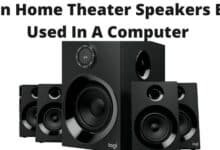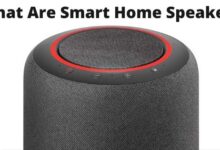If you have been using speakers in your home or anywhere, definitely, you may have encountered a blown speaker; a situation whereby your speaker tends to produce distorted sound or even stops producing a sound.
Well, a blown speaker looks to quite a lot of things, and you need to figure out what exactly had made your speaker blow out.
It is necessary to first check out all possible troubleshooting before coming to the conclusion that you have a blown speaker.
Also, sometimes it may be that the speaker is not blown; rather, the issue is from uneven EQ settings.
Nevertheless, whatever the issue may be, this post is going to be well detailed and comprehensive enough to contain everything you need to know about blown speakers.
Yeah, speakers do blow, but, this does not happen quite often in homes. Most cases of blown speakers are associated with musicians or in studios where the sound is very high and detailed.
Table of Contents
- 1 What is a blown speaker?
- 2 How to identify a blown speaker
- 3 Identify your speaker problems
- 4 Blown out speaker sound effect
- 5 Will a blown-out speaker produce a sound?
- 6 What makes a speaker blow out?
- 7 Blown out car speakers
- 8 Partially blown speaker vs. full-blown speaker
- 9 How the fix a blown speaker?
- 10 Blown subwoofer
- 11 What more?
What is a blown speaker?
The first question goes this way; what is actually a blown speaker? Different people may have different definitions of this question. However, here is a professional answer to the question.
A blown speaker is simply a speaker that does not sound anymore or a speaker that produces wack sound.
To make it more understandable, the term “blown speaker” refers to a bad speaker; either the speaker is not working, or the sound is not pleasant.
When a speaker blows out, that’s not the end of it; so, you don’t have to start thinking of a new one to replace it immediately.
There are still things you could do to revive a blown speaker, especially when the speaker is still sounding but maybe, the sound doesn’t appear good enough.
How to identify a blown speaker
If the speakers are archaic speaker manufacturers very long ago, then, it may be that the foam surround on the speaker cone has gone extremely bad and had fallen apart.
Also, it could be that your speaker’s components have gone bad because of old age. When these are the case(s), then, you need to replace the speaker with a new one.
On the other hand, if your speaker is still quite new and still produces sounds, then, you need to run some troubleshooting to discover what is distorting the sound.
This may look to many things such as listening to the speaker drivers individually to see if any of them produces good sound while the other does not.
Check the EQ settings to see if they are balanced to produce good sound.
Depending on the type of speaker, check the software. When you have perfected the EQ, and the speaker software is okay, then, you can go on to remove the speaker grille to see if some components are torn or damaged.
Identify your speaker problems
Hissing or distorted sound: Once your speaker starts producing an uneven sound, it is blown out.
Possible cause: loosed or damaged voice coils.
Possible solution: playback a CD or any other media (but not radio), reduce the volume and set it at a low level or mid-level, or in-between, then, listen to distortion.
For hissing, try using fade and balance to detect the faulty speaker.
Rattling sound: when you are playing back your music, and you don’t hear the music sound at all, instead you hear some telltale popping sound or some rattling sound. The case is simple; your speaker has blown.
Possible cause: damaged drivers
Possible solution: change/replace your speaker drivers
No bass, treble, or mid-tones: of you noticed that your speaker does not give out bass anymore. Also, the possibility is that your speaker(s) is blown. However, in most cases, this is a partial blown that could be easily fixed.
Possible problem: equalizer is not properly configured
Possible solution: try using EQ to see if you can bring out the bass. If the bass does not come out at all, then, you need to replace the speaker.
No vibrations again: good speakers do vibrate the ground or surface wherein they are placed; once you stop feeling this vibration effects anymore, check out to know if your speaker just blew out.
Possible cause: improper wiring
Possible solution: place your hand on the grills to see if you can feel any vibrations, check if the speaker wires are tightly connected.
Irrespective of how expensive your speaker is, it can still blow out due to vast reasons which would also be discussed in this article.
Blown out speaker sound effect
A blown-out speaker obviously would not produce good sound. When you blow a speaker, the sound effects change significantly, and it is not pleasant to the ears.
Thus, when you start noticing poor or nasty sound effects, there’s a possibility that your speaker has blown out.
Well, you need to understand why speakers blow out and how to prevent it; we will be discussing these in this article, carefully read on.
Will a blown-out speaker produce a sound?
Certainly, although it depends on the intensity of the damage, if the speaker drivers are not wholly damaged, the blown speaker would still produce sound; however, just as said earlier, the sound won’t be pleasant.
What makes a speaker blow out?
What caused my speaker to blow out is a question many people who have been faced with this situation would be asking themselves. Well, here are the possible reasons that could lead to this unpleasant situation.
One of the common reasons that cause speakers to blow is when they are blasting with much power over a very long time.
Every speaker has a limit, and you tune it above its limit for a long time, the components are much likely to blow out.
However, we all know that speakers work hand in hand with amplifiers, and as such, their sound production is dependent on whatever their amps can dish out at extremely high levels.
In terms of instruments, manufacturers do test their instruments rigorously at extremely high levels to ensure that the speaker getting blown is something improbable.
Nevertheless, everything technology has to offer us is liable to fail in one aspect or the other.
Also, it is important to note here that when you blare your music at a decent amount of decibels, sooner or later, your speaker may blow.
That said, it means that one day, your speaker may blow; so, you should expect that.
Blown out car speakers
Even car speakers can blow and get thoroughly damaged. Commonly, once a car speaker fails or reduces in quality of the sound it produces; the speaker is said to be blown.
Car speaker failure is often as a result of mechanical or thermal faults, which makes the speaker not to function as supposed.
When we talk of mechanical speaker failures, this points to when the speaker cone is stressed further than normal (as designed by the manufacturer).
On the other hand, thermal speaker failures occur when the speaker is supplied with excessive power that may cause its internal components to burn or meltdown due to tensed heating.
The general reason why most speakers blow out still applies to car speakers; when you increase the volume of your car speaker to a very level and leave it at that level for a very long time, the speaker is also likely to blow.
Age factor, as well as flimsy material or components, can equally lead to car speaker failures; thus, whether it is car speaker, Home speakers, or any other kind of speaker; the truth is this – all speakers are liable to blow under certain situations, which of course includes increasing the volume to a radical high level and leaving it there for a long time.
Partially blown speaker vs. full-blown speaker
Simply, a partially blown speaker can be repaired by performing certain tweaks or reconfiguring some EQ settings.
On the other hand, a full-blown speaker cannot be fixed or repaired; instead, you’ll have to buy a new speaker entirely, or, replace the drivers/other components.
What kind of speaker do blow most often
The truth is, there is no speaker that cannot blow; it all depends on how the speaker is used, the materials or rather components used, and also the age of the speaker.
A speaker aged up to 20 years is very likely to blow at any given time. So also, a speaker designed with cheap materials and components would blow after some time (even on average usage).
Thus, the point is, all speakers do blow; however, most original speakers last very long (up to 3 decades) before such problems may occur.
Your speaker getting blown is not something bizarre, even though it can be very annoying.
How to avoid blowing speakers?
Many people love to enjoy their sound at very great highs, and this may have led to the damaging of several of their speakers.
Well, if you own any of these best surround speakers, you won’t experience blown speakers too often (at least not for up to a decade or more).
You can also follow our guide on how to place your speakers so that you will enjoy great sound at any level (low, mid, or high).
Also, you may try to avoid leaving your speakers blasting at its highest volume for many hours; this is the commonest reason why speakers do blow.
Keeping the volume at a considerate level will save you from facing a blown speaker ever again.
Another way to avoid blowing speakers is to ensure you always go for original speakers in the market.
We recommend you also consider brands while buying a new speaker, as well as read up reviews about the particular speaker you’re about to buy.
We have written so many speaker reviews here on MyHomeSpeaker; navigate through our categories to read and see our recommendations for the best surround speakers, best bookshelf speakers, best TV soundbars, and more.
How the fix a blown speaker?
Our answer to this question may sound weird to you, but, we strongly believe that it is the best solution for blown speakers.
So what’s our answer? Okay, our answer is – the best way to fix a blown speaker is to replace the drivers or get a new speaker entirely.
While most people will recommend you repair the voice coils or use a sewing needle to perform some tweaks, the processes are hectic, and in the end, you are not sure of getting exactly what you want.
We know that some speakers blow at critical moments when you may not have enough budget to get exactly the model that got damaged; however, there are budget-friendly speakers in the market.
If you have followed this article vividly, we provided some possible solutions to most speaker blew issues above.
Blown subwoofer
With much been said about blown speakers, let’s also talk about blown subwoofers.
Yes, subwoofers also blow! The speaker cone or voice coil can be damaged in a subwoofer. How do you fix that?
- Detach the component speakers:
- Separate the voice coil and speaker cone:
- Fix a new voice coil
- Fix the speaker frame:
- Put back the wires in place
In those simple steps highlighted above, you could be able to fix a blown subwoofer. If you are not comfortable with that, you can opt-in for a piece of new equipment.
What more?
This article has been carefully made to cover everything you need to know about blown speakers, blown subwoofers, how to detect the issues, as well as the possible solutions.
Also, you have to keep in mind that any speaker can blow out; thus, you don’t really have to be sceptic about that.
There are some home speakers and car speakers that are really affordable, and they last quite long.
Our audio experts have taken their time to fish out most of these speakers and have written about them here on this blog. Kindly navigate our categories to read more. Have a nice day ahead!




